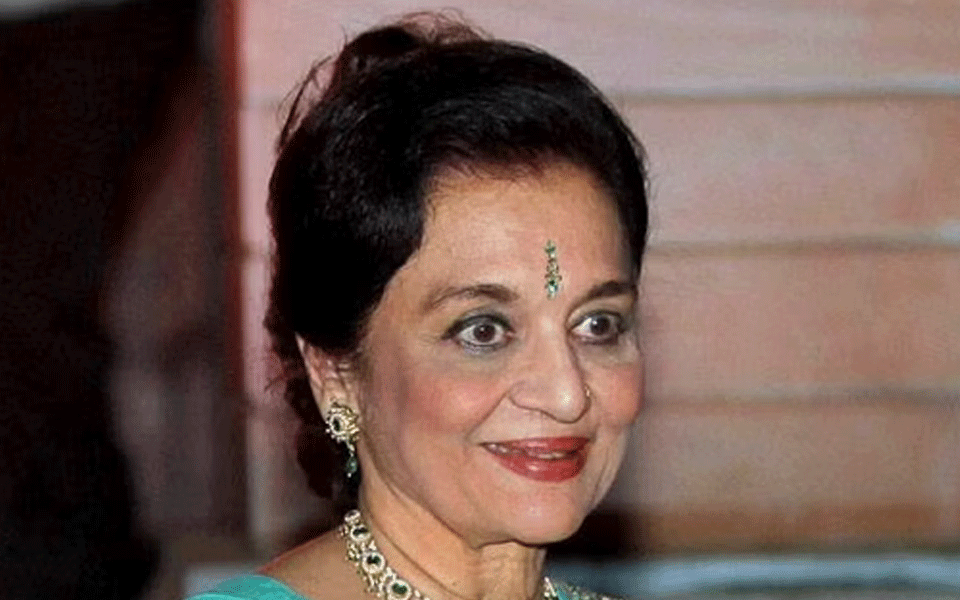New Delhi(PTI): Veteran actor Asha Parekh will be honoured with the Dada Saheb Phalke award for 2020, the highest recognition in the field of Indian cinema, Union Minister for Information and Broadcasting Anurag Thakur said on Tuesday.
Parekh, 79, will be presented with the award during the 68th National Film Awards ceremony, to be held on Friday.
The five-member Dada Saheb Phalke Award committee -- comprising Asha Bhosle, Hema Malini, Poonam Dhillon, Udit Narayan, and TS Nagabharana -- decided on Parekh's name for the honour, Thakur told reporters in his constituency Hamirpur, Himachal Pradesh.
"They decided in the meeting that this time Asha Parekh ji will be honoured with the Dada Saheb Phalke Award, which will be presented during the National Film Awards ceremony. It is a matter of pride for the ministry to announce this prestigious award for the veteran actress," the minister said.
Parekh, an eminent actor whose career spans close to five decades, started her acting career at the age of 10.
Known for starring in over 95 films that include "Dil Deke Dekho", "Kati Patang", "Teesri Manzil", "Baharon Ke Sapne", "Pyar Ka Mausam", and "Caravan", she is considered one of the most influential actresses of all time in Hindi cinema.
She started her career as a child artist with the 1952 film "Aasmaan" and went on to star in Bimal Roy's "Baap Beti" two years later.
Parekh made her debut as a leading lady in Nasir Hussain's 1959 movie "Dil Deke Dekho", in which she starred opposite Shammi Kapoor.
Also a director and producer, Parekh had helmed the acclaimed TV drama "Kora Kagaz" in the late 1990s.
The screen legend also served as the first female chairperson of the Central Board of Film Certification (CBFC) from 1998-2001.
She came out with her autobiography, "The Hit Girl", co-written by film critic Khalid Mohamed, in 2017.
She was also honoured with the Padma Shri, the fourth-highest civilian award of the country, in 1992.
Last year, the Dadasaheb Phalke Award for 2019 was conferred on Rajinikanth.
Let the Truth be known. If you read VB and like VB, please be a VB Supporter and Help us deliver the Truth to one and all.
Hyderabad (PTI): Telangana Chief Minister A Revanth Reddy met Union Home Minister Amit Shah in Delhi on Wednesday night and urged him to increase the sanctioned strength of IPS officers to the state in view of its growing administrative and security needs.
The two leaders also discussed the recent surrender of several senior Maoist leaders before the Telangana Police and other issues.
"During the meeting, the two leaders discussed the issue of Maoist surrenders and their rehabilitation. The chief minister informed Shah that significant improvements in policing have taken place in Telangana over the past two years," an official release here said.
Highlighting that 591 Maoists have laid down their arms and joined the mainstream of society during this period, the chief minister said the state government was providing them compensation and rehabilitation assistance as per the rules.
He requested the Union home minister to extend financial support from the central government for development works in the backward regions of the state.
Reddy also urged Shah to increase the sanctioned strength of IPS officers to the state from 83 to 105 in line with the state's growing administrative and security needs, the statement said.
The first cadre review after the formation of Telangana was conducted in 2016, while the next review, due in 2021, was delayed and finally carried out in 2025. Even then, only seven additional IPS officers were allocated to the state, the chief minister informed Shah and requested that the third cadre review be conducted in 2026 as per the schedule.
Reddy explained that Telangana, like the rest of the country, is facing several modern challenges, including cybercrime, drug trafficking, white-collar crimes, and other emerging security threats.
He highlighted the reorganisation of the Hyderabad, Cyberabad, and Malkajgiri Police Commissionerates, the proposed formation of the Future City Commissionerate and the rapidly growing population in Hyderabad to underline the increasing administrative requirements of the state.





